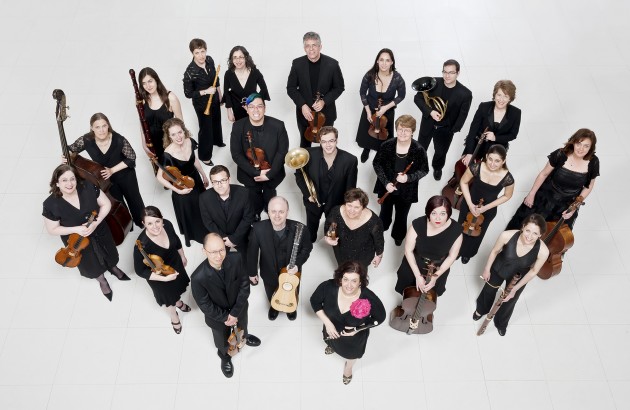Tempesta di Mare brings vitality and polish to Tropical Baroque Festival

Tempesta di Mare performed Thursday night at Miami Beach Community Church.
The Miami Bach Society’s Tropical Baroque Festival turned to orchestral music on Thursday night with Tempesta di Mare. The Philadelphia-based Baroque band, offered “The Nations,” a program of works by composers who depicted countries they knew only from written accounts and legends.
Unlike many period-instrument groups, the 22-member ensemble consistently produces a highly polished corporate sonority. Their intonation and unanimity is unfailingly precise and the warm and alluring sound of gut strings blended wonderfully with the lighter timbres of Baroque winds. The instruments never sounded raw or harsh.
Although Tempesta di Mare plays without a conductor, concertmaster Emlyn Ngai clearly leads the group, setting the tone and pace of performances. In the up-close acoustic of Miami Beach Community Church, the orchestra’s brilliant playing made the best case for the mostly rarely played repertoire.
The most familiar work of the evening was Georg Philipp Telemann’s Orchestral Suite in B-flat (“Folk Suite”), the program’s opener. The prolific German Baroque master ingeniously depicts Turkish, Swiss, Russian and Portuguese music and dance as well as more formal dances and witty riffs. The ensemble’s incisive string attack and crisp articulation gave the overture plenty of spirit.
A Baroque version of Mozart and Beethoven’s Turkish music with drum and lute adding color featured some spicy dissonance. The divided violins contributed to the charm of the alternate drone and rapid plucking of strings, depicting Swiss revelry. The stately sarabande and brisk and jaunty rigaudon in the Portuguese section demonstrated the ensemble’s keen attention to variegated dynamics and coordinated articulation.
While none of the other composers on the program approached the mastery of Telemann, inventive scores by Matthew Locke and Jan Dismas Zelenka proved diverting. The Englishman Locke was represented by a suite from incidental music for Shakespeare’s The Tempest, appropriate for this 400th anniversary year of The Bard’s passing. The rustic dance featured an imitation of country fiddle tunes while the jig had a whiff of John Bull courtliness.
The Czech Zelenka’s Suite in F shows the influences of his travels and performances in Naples, Venice and Vienna. Contrapuntal writing in the overture was assayed smoothly, with the individual instrumental lines clearly audible. Peasant dance infuses an unconventional minuet and finale, filled with unexpected twists of melody and volume.
Francesco Barsanti’s Overture in D for strings with harpsichord trod more conventional Baroque paths, leavened by a bucolic country dance that was played with uninhibited exuberance. Johann Helmich Roman was known as ‘the Swedish Handel.’ His Music for the Drottningholm Palace, created for a royal wedding, is replete with pomp and ceremony.
Special kudos to concertmaster Ngai, the hard working percussionist Michelle Humphreys, harpsichordist Adam Pearl and the group’s co-directors Gwyn Roberts (superb on flute and recorder) and Richard Stone (a consistently elegant lutenist). Tempesta di Mare is the model of a top notch period orchestra, presenting unusual repertoire in first rate performances. They should return soon and play some of these musicological excavations for Miami audiences.
The Tropical Baroque Festival continues 8 p.m. Saturday at Miami Beach Community Church with Quicksilver playing Stile Moderno, new music from 17th century Italy and Germany. tropicalbaroquemusicfestival.org
Posted in Performances
Leave a Comment
Fri Mar 4, 2016
at 2:53 pm
No Comments